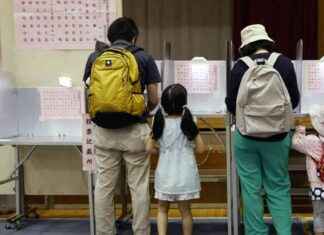“Where are they going?” headlines Friday Yediot Aharonot, the best-selling newspaper in Israel, with portraits of Benjamin Netanyahu, indicted for corruption, and the rising star of the extreme right, Itamar Ben Gvir.
With 64 seats, the right-wing bloc led by Mr. Netanyahu, stripped of power in June 2021 after 12 years of continuous rule, came out on top in Tuesday’s legislative elections.
His party, the Likud, won 32 seats, his ultra-Orthodox allies 18 and the “Religious Zionism” alliance 14, a record for the far right.
“This is going to be an unprecedented government,” predicts political columnist Sima Kadmon in Yediot Aharonot. “Most of the big wallets will be in the hands of fanatics… Everyone knows that if only a fraction of what was promised is implemented, it’s going to be a different country.”
Opposite, the “anti-Netanyahu” camp led by outgoing Prime Minister Yair Lapid (centrist) won 51 seats.
The announcement, Thursday evening, of the results of the legislative elections, the 5th in three and a half years, occurred in a context of renewed Israeli-Palestinian violence.
The Israeli army hit “military sites” in the Gaza Strip overnight after rockets fired from this Palestinian enclave towards Israel. And on Thursday four Palestinians, including an assailant, a fighter and a teenager, were killed by Israeli forces in the occupied West Bank and East Jerusalem.
The Gaza enclave has been under Israeli blockade for more than 15 years and the West Bank and East Jerusalem have been occupied by Israel since 1967.
The head of American diplomacy, Antony Blinken, expressed Thursday his “deep concern” at the violence and called for a de-escalation.
In accordance with Israeli electoral law, the final results of the legislative elections will be transmitted on November 9 to President Isaac Herzog, who will then have to officially mandate the candidate who has received the most recommendations from the parties to form a government, probably Mr. Netanyahu.
The latter will then have 42 days to form his team.
According to local media, he has already mandated Yariv Levin, one of his relatives, to start talks which could be complicated, with the formation “Religious Zionism” in particular.
The leader of this party, Bezalel Smotrich, has indicated that he wants the Ministry of Defense, and his No. 2 Itamar Ben Gvir, that of Public Security, two key positions at the forefront of the Israeli-Palestinian conflict.
Among the ultra-Orthodox, the leader of the Sephardic Shass party, Arieh Dery, invigorated by his eleven seats, is eyeing Finance or the Interior. Mr. Dery was convicted of tax evasion in 2021 and had previously been jailed for corruption.
– “Who is the master!” –
But Mr. Netanyahu is aware that propelling these personalities to key positions could “damage” his relations abroad, estimates Shlomo Fischer, of the Jewish People Policy Institute in Jerusalem.
“He doesn’t want Messrs. Ben Gvir and Dery leading the dance,” the analyst told AFP. “He is very careful, he does not want to lose his international legitimacy (…) He could try to widen his coalition to minimize their influence”.
As Mr. Ben Gvir multiplies calls to use force against the Palestinians and to “show who is the master” in Israel, the United States said, before the announcement of Mr. Netanyahu’s victory, it hoped that “all Israeli leaders will continue to share the values of a democratic society that promotes tolerance for all civil society, especially minority groups”.
From his time as prime minister before 2021, Netanyahu had alienated Israel’s historic allies in US President Joe Biden’s Democratic Party and worked closely with former Republican President Donald Trump.
The United Kingdom also called on Thursday, before the announcement of the final results, “all Israeli parties to refrain from inflammatory language and to show tolerance and respect for minority groups”.








